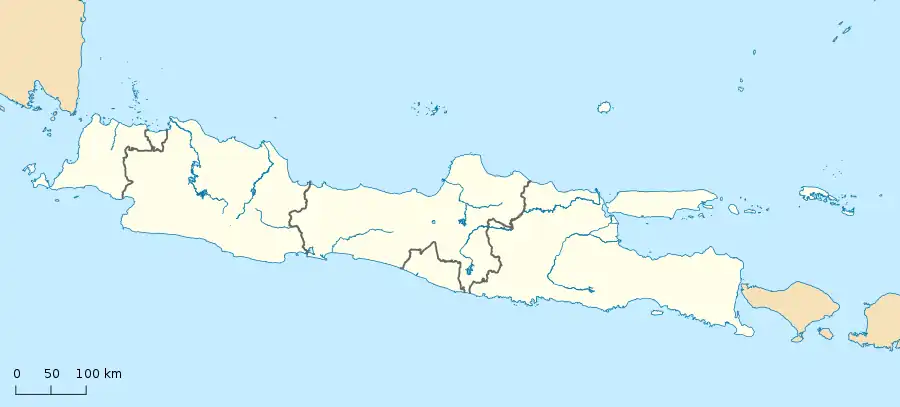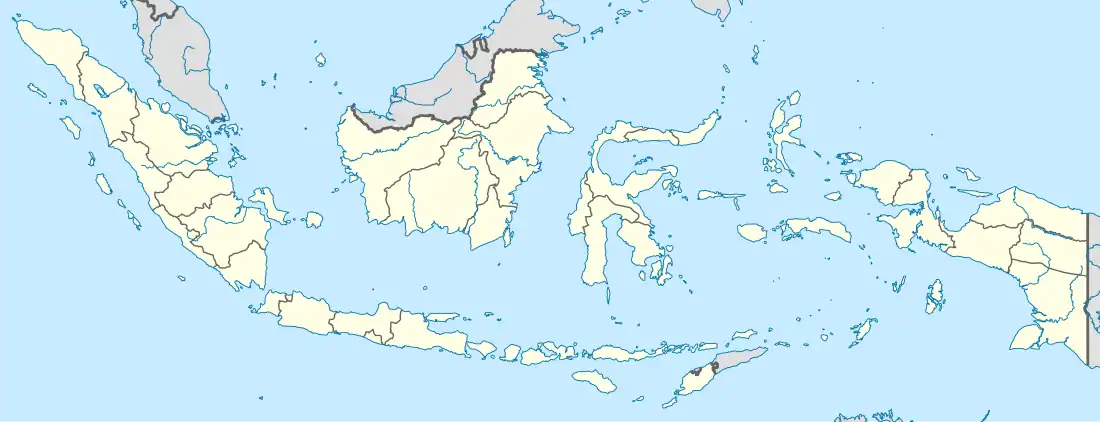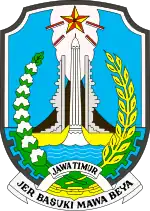Kediri | |
|---|---|
| City of Kediri Kota Kediri | |
| Other transcription(s) | |
| • Javanese | Kutha Kadhiri (Latin) ꦏꦸꦛꦏꦝꦶꦫꦶ (Hanacaraka) كوڟا كاڎيري (Pegon) |
| • Chinese | 谏义里市 |
 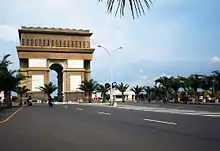  | |
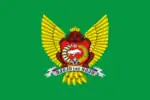 Flag  Coat of arms | |
| Motto(s): Joyo ing Boyo (Triumphant against the catastrophe) | |
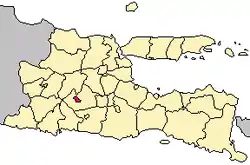 Location within East Java | |
| Coordinates: 07°48′40″S 112°00′17″E / 7.81111°S 112.00472°E | |
| Country | |
| Province | |
| Government | |
| • Mayor | Abdullah Abu Bakar |
| Area | |
| • Total | 67.20 km2 (25.95 sq mi) |
| Elevation | 65 m (213 ft) |
| Population (mid 2022 estimate) | |
| • Total | 289,418 |
| • Density | 4,300/km2 (11,000/sq mi) |
| [1] | |
| Time zone | UTC+7 (IWST) |
| Area code | (+62) 354 |
| Vehicle registration | AG |
| Website | kedirikota.go.id |
Kediri (Javanese: ꦏꦸꦛꦏꦝꦶꦫꦶ, Kutha Kadhiri) is an Indonesian city, located near the Brantas River in the province of East Java on the island of Java. It covers an area of 67.20 km2 and had a population of 268,950 at the 2010 Census[2] and 286,796 at the 2020 Census;[3] the official estimate as at mid 2022 was 289,418 (comprising 144,876 males and 144,542 females).[1] It is one of two 'Daerah Tingkat II' that have the name 'Kediri' (the other is the Regency of Kediri, which surrounds the city). The city is administratively separated from the Regency, of which it was formerly the capital.
Archaeological artefacts discovered in 2007 appeared to indicate that the region around Kediri may have been the location of the Kediri Kingdom, a Hindu kingdom in the 11th century.[4]
The city is a major trade centre for the Indonesian sugar and cigarette industry.[5] Kediri is the second largest city by economy in East Java, after Surabaya, with a 2016 estimated GDP at Rp76.95 trillion.[6]
History
Traditionally, the city of Kediri is said to have been founded on 27 July 879,[7] and today the city's anniversary is celebrated on that date.[8] The Brantas River valley was known as the site of classical Javanese culture, particularly between the 10th and 15th centuries. The town of Kediri was established by King Airlangga on the banks of the upper Brantas river in 1042. It was originally called Dahanapura or Daha. After the death of Airlangga his kingdom was divided into two parts: the kingdom of Panjalu in the west, and the kingdom of Janggala in the east. Daha became the capital of Panjalu, and later the capital of the Kediri kingdom.[9]: 146–147, 158 Over the centuries, control of the city passed to the Singhasari, Majapahit, Demak and Mataram kingdoms.
The name "Kediri", or "Kadiri", is derived from the Sanskrit word Khadri, meaning Indian Mulberry, indicative of the mulberry trees (locally known as pacé or mengkudu) which grew in the area.
.png.webp)
After the era of the Javanese kingdoms, Kediri went into decline, becoming a small rural settlement, which was later annexed by the Dutch East India Company (VOC) as part of the Dutch conquest of Java. East Java in the 1740s was controlled by Cakraningrat IV, a Madurese regent who was favorably disposed toward the VOC, as he believed the Dutch would help him in securing the independence of Madura from the Kasunanan Kartasura kingdom. However, when his plans were rejected by the VOC, Cakraningrat rise against the Europeans. The rebellion was ultimately suppressed by the VOC, assisted by two generals sent by Pakubuwana II, Sunan Kartasura. Kediri then became part of the VOC and remained under Dutch control until the independence of Indonesia in 1945.[10]
Kediri began to flourish when the Dutch East Indies founded the autonomous Gemeente Kediri in 1906. Zelfstanding Gemeenteschap (self-government with full autonomy) was granted in 1928.
During the Indonesian National Revolution in 1945–1949, Kediri became a target of General Sudirman's guerrilla campaign. Kediri suffered terrible bloodshed during the Indonesian mass killings of 1965–66 after the failed 30 September Movement coup. One estimate suggests that around 13% of Kediri's population or 22,000 people were killed during the Indonesian mass killings of 1965-66.[11]
The Gudang Garam kretek tobacco industry was established in 1958 by Chinese Indonesian Tjoa Ing Hwie. He purchased vast lands in Kediri and established a kretek cigar factory. Today, Gudang Garam is the major employer of the city, with more than 40,000 workers.
Administrative districts
The city of Kediri is divided into three districts (kecamatan), tabulated below with their areas and their population totals from the 2010 Census[2] and the 2020 Census,[3] together with the official estimates as at mid 2022.[1] The table also includes the locations of the district administrative centres, the number of administrative villages (urban kelurahan) in each district, and its postal codes.
| Kode Wilayah | Name of District (kecamatan) | Area in km2 | Pop'n Census 2010 | Pop'n Census 2020 | Pop'n Estimate mid 2022 | Admin centre | No. of villages | Post codes |
|---|---|---|---|---|---|---|---|---|
| 35.71.01 | Mojoroto | 26.93 | 108,369 | 114,553 | 115,346 | Bandar Lor | 14 | 64111 - 64119 |
| 35.71.02 | Kota (Kediri) | 15.95 | 81,803 | 84,291 | 84,446 | Banjaran | 17 | 64121 - 64129 |
| 35.71.03 | Pesantren | 24.32 | 78,335 | 87,952 | 89,626 | Bangsal | 15 | 64131 - 64139 |
| Totals | 67.20 | 268,507 | 286,796 | 289,418 | Kota | 46 |
The names of the kelurahan in each district area:
- Mojoroto District: Bandar Kidul, Bandar Lor, Banjarmlati, Bujel, Campurejo, Dermo, Gayam, Lirboyo, Mojoroto, Mrican, Ngampel, Pojok, Sukorame, Tamanan.
- Kota District: Balowerti, Banjaran, Dandangan, Jagalan, Kaliombo, Kampungdalem, Kemasan, Manisrenggo, Ngadirejo, Ngronggo, Pakelan, Pocanan, Rejomulyo, Ringinanom, Semampir, Setonogedong, Setonopande.
- Pesantren District: Banaran, Bangsal, Betet, Bawang, Blabak, Burengan, Jamsaren, Ketami, Ngletih, Pakunden, Pesantren, Singonegaran, Tempurejo, Tinalan, Tosaren.
Society and culture
Being the site of an ancient capital of Javanese kingdoms, the city is one of the major cultural centres for Javanese people, the city also contains some ancient ruins and candis that date back to the era of the Kediri and Majapahit Kingdom.
Sport
Kediri is the home of Persik Kediri, which plays in the Premier Division of the Indonesian Football League. Persik Kediri has won a total of two titles of the Premier Division of Indonesian Football League, last occurring in 2006.
Education
Kediri city has Three National Universities, they are Universitas Brawijaya (branch III Kediri),[12] STAIN Kediri, and Politeknik Negeri Kediri. Kediri also has many private institutions for higher education, such as the Institut Ilmu Kesehatan Bhakti Wiyata, Universitas Nusantara PGRI Kediri, Universitas Kadiri, and Universitas Islam Kadiri.
Tourism
The city of Kediri hardly has any natural attractions for a tourist destination. A few amusement parks are present, e.g. Paggora Amusement Park, Tirtayasa Water Park, Selomangleng Water Park. Selomangleng Cave is a man-made cave, allegedly used by the princess Dewi Kilisuci to meditate, according to folk tales. A few shopping centres are also built in the city, such as Golden Swalayan, and Kediri Mall. Along with the older shopping district Jalan Dhoho they serve the population of Kediri (both the city and the regency) and the surrounding areas.
List of mayors
In 1906 Kediri was given the status of a gemeente, along with its gemeenteraad. The head was an assistent-resident. In 1929 its status was changed to stadsgemeente with a burgemeester as its head. With the Act no. 16 Year 1950, Kediri is given the status of Kota Besar with a walikota (mayor) within Indonesian administrative structure[13]
Dutch East-Indies period
- Mr. L.K. Wennekendonk (1929–1936)
- J.G. Ruesink (1936–1940)
- M. Scheltema (1940–1941)
- Dr. J.R. Lette (1941–1942)
Indonesian period
- R. Soeprapto (1945–1950)
- R. Dwidjo Soemarto (1950–1960)
- R. Soedjono (1960–1966)
- Hartojo (1966–1968)
- Anwar Zainuddin (1968–1973)
- Drs. Soedarmanto (1973–1978)
- Drs. Setijono (1978–1989)
- Drs. Wijoto (1989–1999)
- H.A. Maschut (1999–2009)
- Dr. H. Samsul Ashar Sp.PD (2009–2014)
- Abdullah Abu Bakar, S.E. (2014-now)
Climate
Kediri has a tropical savanna climate (Aw) with moderate to little rainfall from June to October and heavy rainfall from November to May.
| Climate data for Kediri | |||||||||||||
|---|---|---|---|---|---|---|---|---|---|---|---|---|---|
| Month | Jan | Feb | Mar | Apr | May | Jun | Jul | Aug | Sep | Oct | Nov | Dec | Year |
| Mean daily maximum °C (°F) | 29.5 (85.1) |
29.6 (85.3) |
29.9 (85.8) |
30.5 (86.9) |
30.7 (87.3) |
30.8 (87.4) |
30.7 (87.3) |
31.4 (88.5) |
32.2 (90.0) |
32.3 (90.1) |
31.4 (88.5) |
30.2 (86.4) |
30.8 (87.4) |
| Daily mean °C (°F) | 25.5 (77.9) |
25.6 (78.1) |
25.7 (78.3) |
26.0 (78.8) |
25.9 (78.6) |
25.5 (77.9) |
25.0 (77.0) |
25.4 (77.7) |
26.2 (79.2) |
26.6 (79.9) |
26.4 (79.5) |
25.8 (78.4) |
25.8 (78.4) |
| Mean daily minimum °C (°F) | 21.5 (70.7) |
21.6 (70.9) |
21.6 (70.9) |
21.6 (70.9) |
21.1 (70.0) |
20.2 (68.4) |
19.4 (66.9) |
19.5 (67.1) |
20.2 (68.4) |
21.0 (69.8) |
21.4 (70.5) |
21.5 (70.7) |
20.9 (69.6) |
| Average rainfall mm (inches) | 324 (12.8) |
314 (12.4) |
316 (12.4) |
206 (8.1) |
134 (5.3) |
41 (1.6) |
39 (1.5) |
23 (0.9) |
27 (1.1) |
52 (2.0) |
136 (5.4) |
274 (10.8) |
1,886 (74.3) |
| Source: Climate-Data.org[14] | |||||||||||||
Notable people from Kediri
- Susilo Wonowidjojo, an Indonesian billionaire businessman and owner of Gudang Garam
- Pramono Anung, Indonesian Secretary of the Cabinet (2015–...)
- Nurbayan, singer and songwriter
- Anthony Fokker, Dutch aviation pioneer and aircraft manufacturer
- Nadeo Argawinata, Indonesian footballer who currently plays for Bali United.
See also
References
- 1 2 3 Badan Pusat Statistik, Jakarta, 2023, Kota Kediri Dalam Angka 2023 (Katalog-BPS 1102001.3571)
- 1 2 Biro Pusat Statistik, Jakarta, 2011.
- 1 2 Badan Pusat Statistik, Jakarta, 2021.
- ↑ Kediri archeological discovery offers clues on ancient kingdom Archived 28 March 2007 at the Wayback Machine, The Jakarta Post, 24 March 2007.
- ↑ Kediri Archived 25 February 2008 at the Wayback Machine, Encyclopædia Britannica.
- ↑ Badan Pusat Statistik (2017). Produk Domestik Regional Bruto Kabupaten/Kota di Indonesia 2012-2016. Jakarta: Badan Pusat Statistik.
- ↑ "Selayang Pandang Kota Kediri". Municipal Government of Kediri. Archived from the original on 25 May 2019. Retrieved 25 May 2019.
- ↑ "Hari Jadi Ke-1.139, Pemkot Kediri Gelar Upacara Manusuk Sima". Radio Republik Indonesia. 27 July 2018. Archived from the original on 25 May 2019. Retrieved 25 May 2019.
- ↑ Cœdès, George (1968). The Indianized states of Southeast Asia. University of Hawaii Press. ISBN 9780824803681. Archived from the original on 21 February 2017. Retrieved 22 September 2016.
- ↑ "History of Kediri by City Council". Archived from the original on 29 September 2013. Retrieved 20 October 2013.
- ↑ Chandra, Siddharth "New Findings on the Indonesian Killings of 1965–66", Association for Asian Studies 76 no.4, (November 2017):1059-1086.
- ↑ "Program Studi UB Kampus III Kediri | SELMA UB". selma.ub.ac.id (in Indonesian). Archived from the original on 5 January 2020. Retrieved 26 September 2018.
- ↑ "Undang-undang No. 16 Tahun 1950" (PDF). hjdih.surabaya.go.id. Jaringan Dokumentasi dan Informasi Hukum. 14 August 1950. Retrieved 2 February 2017.
- ↑ "Climate: Kediri". Climate-Data.org. Archived from the original on 8 February 2018. Retrieved 16 November 2020.
